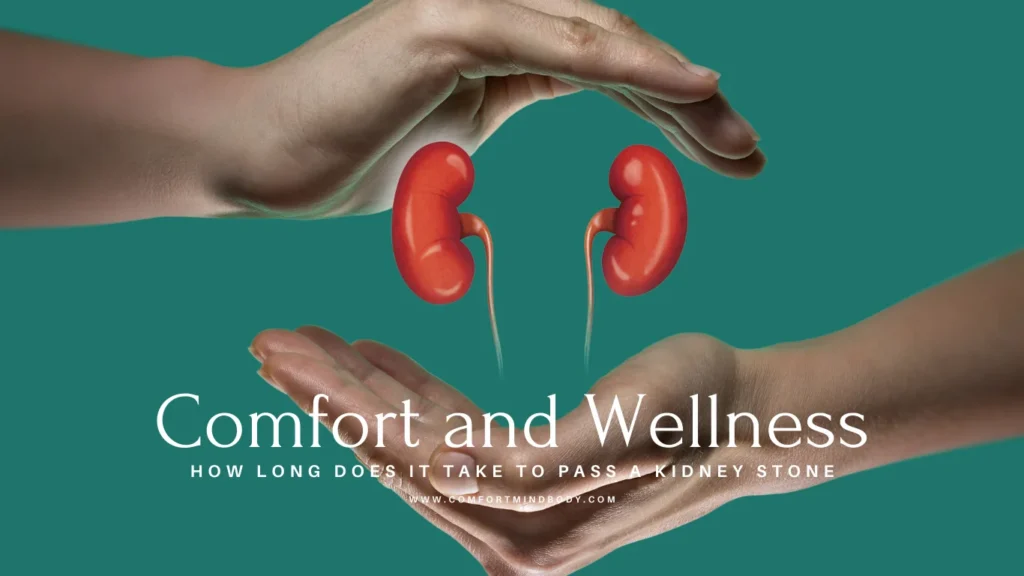Table of Contents
ToggleIntroduction:
How Long Does It Take to Pass a Kidney Stone? Kidney stones are a widespread health issue that affects countless people worldwide. These small, hard deposits form in the kidneys. They can cause severe pain and discomfort.
This leads to many questions about where they come from, how long they take to pass, and what treatments are available. This article aims to demystify kidney stones, providing a comprehensive overview of their causes, symptoms, and available treatments.
Passing a kidney stone can seem scary or confusing to many people. However, knowing more about the process can help reduce some of the worry related to this condition. Armed with the right knowledge, individuals can better manage their symptoms and seek appropriate treatment. Furthermore, understanding the risk factors can help in preventing the formation of kidney stones in the first place.
Kidney stones are not a modern-day phenomenon. They have been affecting humans for thousands of years, with evidence of kidney stones found in ancient Egyptian mummies.
Despite this long history, many aspects of kidney stones remain misunderstood, leading to myths and misconceptions. This article aims to debunk these misunderstandings, offering scientific and medical insights into kidney stones.
Understanding What Are Kidney Stones:
Kidney stones, medically known as renal calculi, are hard, mineral deposits that form in the kidneys. They are usually comprised of calcium, oxalate, and sometimes uric acid. While small stones may not cause any noticeable symptoms, larger stones can cause intense pain and other complications.
Kidney stones begin to form when the kidneys are unable to process and excrete waste efficiently. High levels of certain substances, such as calcium, oxalate, or uric acid, can crystallize and form stones. The size of these stones can range from tiny grains of sand to large pebbles.
The formation of kidney stones is often related to dietary factors, genetic predisposition, and certain medical conditions. Knowing these factors can help prevent kidney stones. It can also help manage the condition if it happens.
Causes Of Kidney Stones:
There are several factors that can contribute to the formation of kidney stones. One of the most common causes is dehydration. When the body is dehydrated, the kidneys must work harder to filter and excrete waste, which can lead to the formation of kidney stones.
Drinking plenty of water is one of the easiest and most effective ways to prevent kidney stones.
The diet also plays a significant role in kidney stone formation. Consuming too much animal protein, sodium, or sugar can increase the risk of kidney stones. Some foods, like spinach and rhubarb, have high levels of oxalates. These can lead to calcium oxalate stones.
Certain medical conditions and medications can also increase the risk of developing kidney stones. Conditions such as obesity, diabetes, and gout can make a person more susceptible to kidney stones. Certain medications, such as diuretics and calcium-based antacids, can also increase the risk.
How Long Does It Take To Pass A Kidney Stone?
One of the most common questions that people ask is, “How long does it take to pass a kidney stone?” The answer to this question varies depending on the size of the stone and the individual’s overall health. Small stones might pass within a few days, while larger stones can take weeks or even months to pass.
The process of passing a kidney stone involves the stone moving from the kidney. It travels through the ureter and exits the body through the urinary tract. This journey can be painful, particularly when the stone moves into the narrow ureter.
Drinking plenty of water can help speed up this process by encouraging urination, which can help push the stone out of the body. Pain medication can also be used to manage the discomfort associated with passing a kidney stone.
Symptoms Of Kidney Stones:
While kidney stones can affect both men and women, there are certain symptoms that may be more prevalent or noticeable in women. These symptoms can include severe pain in the back or side. You may also see blood in your urine. Other signs are frequent urination and nausea or vomiting.
The pain from kidney stones can be sharp and strong. It is often called one of the worst pains a person can feel. Women may also experience pain during urination or a persistent urge to urinate.
Sometimes, kidney stones can cause urinary tract infections. These infections can lead to more symptoms like fever and chills. It’s important for women to be aware of these symptoms and seek medical attention if they suspect they may have a kidney stone.
What Does A Kidney Stone Feel Like?
The first signs of kidney stones can vary widely from person to person. Some people may not experience symptoms until the stone starts moving within the kidney or passing into the ureter. Common early signs can include lower back pain, stomach pain, blood in the urine, or changes in how often you urinate.
The pain associated with kidney stones is often described as sharp, intense, and fluctuating. It may come in waves and change in severity as the stone moves through the urinary tract.
Other early signs of kidney stones can include a constant urge to urinate. You may also urinate more often than normal. Some people feel a burning sensation when they urinate. The pain may shift toward the lower abdomen or groin as the stone moves closer to the bladder.
Location And Intensity Of Kidney Stone Pain:
The place and strength of kidney stone pain can give important hints about the size and spot of the stone. The pain usually starts when the stone moves from the kidney to the ureter. The ureter is the small tube that carries urine from the kidney to the bladder.
The pain typically begins in the back or side below the ribs and can radiate to the lower abdomen and groin. The pain can be very intense. Many people say it is one of the worst types of pain they can feel.
The pain may come and go in waves, often growing in intensity as the stone moves through the urinary tract. Drinking fluids may make it worse. This is because it increases urine and puts more pressure on the stone.
Passing A Kidney Stone Naturally And In 24 Hours:
Passing a kidney stone can be very painful. However, there are steps you can take to make it easier and reduce the pain. Staying hydrated is important. Drinking enough water helps flush the urinary system and can help the stone pass.
Pain management is also essential. Over-the-counter pain relievers like ibuprofen can help reduce the pain from passing a kidney stone. In some cases, a doctor may prescribe stronger pain medication.
There is no sure way to pass a kidney stone in 24 hours. How long it takes depends on the stone’s size and location. However, drinking plenty of water, taking pain medication, and staying active can all help to facilitate the process.
Kidney Stone Surgery And Medication:
Sometimes, natural methods might not be enough to pass a kidney stone. In these cases, medical help may be needed. This can include medication to help dissolve the stone or surgical procedures to remove it.
There are several types of kidney stone surgeries, including extracorporeal shock wave lithotripsy (ESWL), ureteroscopy, and percutaneous nephrolithotomy. The choice of procedure depends on the size and location of the stone, as well as the patient’s overall health.
Medication can also be used to treat kidney stones. Certain medications can help to dissolve the stone, while others can help manage pain and prevent further stone formation. A healthcare provider can provide individualized treatment recommendations based on the patient’s specific circumstances.
Renal Calculi:
The term “renal calculi” is a medical term used to refer to kidney stones. It comes from the Latin words “ren” meaning kidney, and “calculus” meaning small stone. Knowing these terms can help when talking about kidney stones with doctors or reading medical articles on the subject.
Kidney stones form when there are a lot of certain substances in the urine. These substances include calcium, oxalate, or uric acid. These substances can form crystals and create stones. These stones can get stuck in the kidneys or ureters. This can cause pain and other problems.
The size and location of kidney stones can greatly affect a person’s symptoms and treatment options. Therefore, understanding the term and its implications can be crucial in managing this health condition effectively.
Conclusion:
In conclusion, kidney stones are a common, but often misunderstood, health condition. While they can hurt and feel uncomfortable, understanding the causes, symptoms, and treatments can help people manage the condition.
Preventative measures can also play a crucial role in reducing the risk of kidney stone formation.
You can stay healthy by:
- Drinking enough water.
- Eating a balanced diet that is low in salt and animal protein.
- Managing any health problems.
Remember, if you suspect you may have a kidney stone, seek medical attention. Kidney stones can cause severe pain. In some cases, they can lead to more serious problems. Early detection and treatment can help to alleviate symptoms and prevent further complications.
If you want to learn more about kidney stones, their symptoms, and how to treat them, please reach out to a healthcare professional. If you have specific health questions, they can help you. They can provide you with personalized advice and treatment options based on your specific circumstances.
Affiliate Disclosure:
The links contained in this product review may result in a small commission. This goes towards supporting our research and editorial team and please know we only recommend high-quality products.
Note: This article is for informational purposes only and is not intended to diagnose, treat, or cure any disease. Always consult a healthcare professional before taking any supplement or making any changes to your diet or lifestyle.





